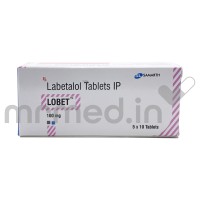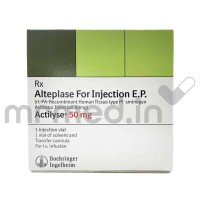Primacor 10mg Injection is an inotropic medication containing the active ingredient Milrinone. This medication is used to treat severe congestive heart failure, a condition where the heart's ability to pump blood is suddenly compromised. It is often used when other treatments are ineffective, such as when the patient doesn't respond well to diuretics or other medications.
This drug is contraindicated in individuals with known hypersensitivity or allergy to it or its component. Individuals with certain heart conditions such as valve narrowing, thickening, blockage, low blood pressure, kidney problems, or a history of arrhythmias should use Primacor 10mg Injection with caution. If you have experienced heart problems as a result of taking water tablets (diuretics) in the past, it's important to inform your physician about all your medical conditions and medications before starting the treatment.
Primacor 10mg Injection can have an effect on your blood pressure and heart rate, and doctors must verify that these vital signs are safe. Blood pressure and pulse rate should be checked regularly. Tracking this parameter provides information about how your body reacts to the medicine. In case your blood potassium levels are low, your doctor may want to closely monitor you during treatment. They may perform blood tests to determine your potassium levels. If you are pregnant, breastfeeding, or trying to become pregnant,, report to your doctor before starting the treatment with this drug.
Therapeutic Effects of Primacor 10mg Injection
Pregnancy
If you are pregnant, suspecting, or planning for the pregnancy, report to your doctor before starting the treatment with Primacor 10mg Injection.
Breast Feeding
If breastfeeding, consult your doctor before starting the treatment with Primacor 10mg Injection.
Lungs
It is unknown whether Primacor 10mg Injection is safe for patients with lung problems. Inform your physician if you have lung disease before starting the treatment.
Liver
It is unknown whether Primacor 10mg Injection is safe for patients with liver problems. Inform your physician if you have liver disease before starting the treatment.
Alcohol
It is unknown whether consuming alcohol interacts with the Primacor 10mg Injection. Please consult your doctor for more advice.
Driving
It is unknown whether Primacor 10mg Injection alters driving ability. However, if you experience side effects like tiredness or drowsiness, avoid driving and using machines.
Serious
- Allergic reaction (swallowing or breathing problems, swelling of lips, face, tongue, or throat)
- Increased or fast heartbeats, feeling lightheaded, faint or shortness of breath
Common
- Headache
- Low blood pressure (feeling dizzy)
Primacor 10mg Injection works by a different mechanism compared to other commonly used heart failure medications. It directly enhances the heart's pumping ability by increasing the force of contraction, whereas other medications may work by reducing fluid buildup or improving the heart's electrical activity.
No, Primacor 10mg Injection is administered in a hospital or clinical setting through an IV infusion. It requires close monitoring of the patient's vital signs and cardiac function.
Primacor 10mg Injection treatment is usually short-term and given for a few days. It is used to stabilize a patient's condition during acute heart failure episodes or while waiting for other treatments to take effect.
Primacor 10mg Injection is generally used in cases of acute decompensated heart failure, particularly when there's a need for short-term improvement in cardiac function. It may not be suitable for all types of heart failure or for long-term use.
Primacor 10mg Injection is usually administered through an intravenous (IV) infusion. This means it's delivered directly into the bloodstream through a vein.
Molecule name: Milrinone | Therapeutic class: Inotropic agents |
Pharmacological class: Phosphodiesterase inhibitors | Indications: Treatment of severe congestive heart failure |







